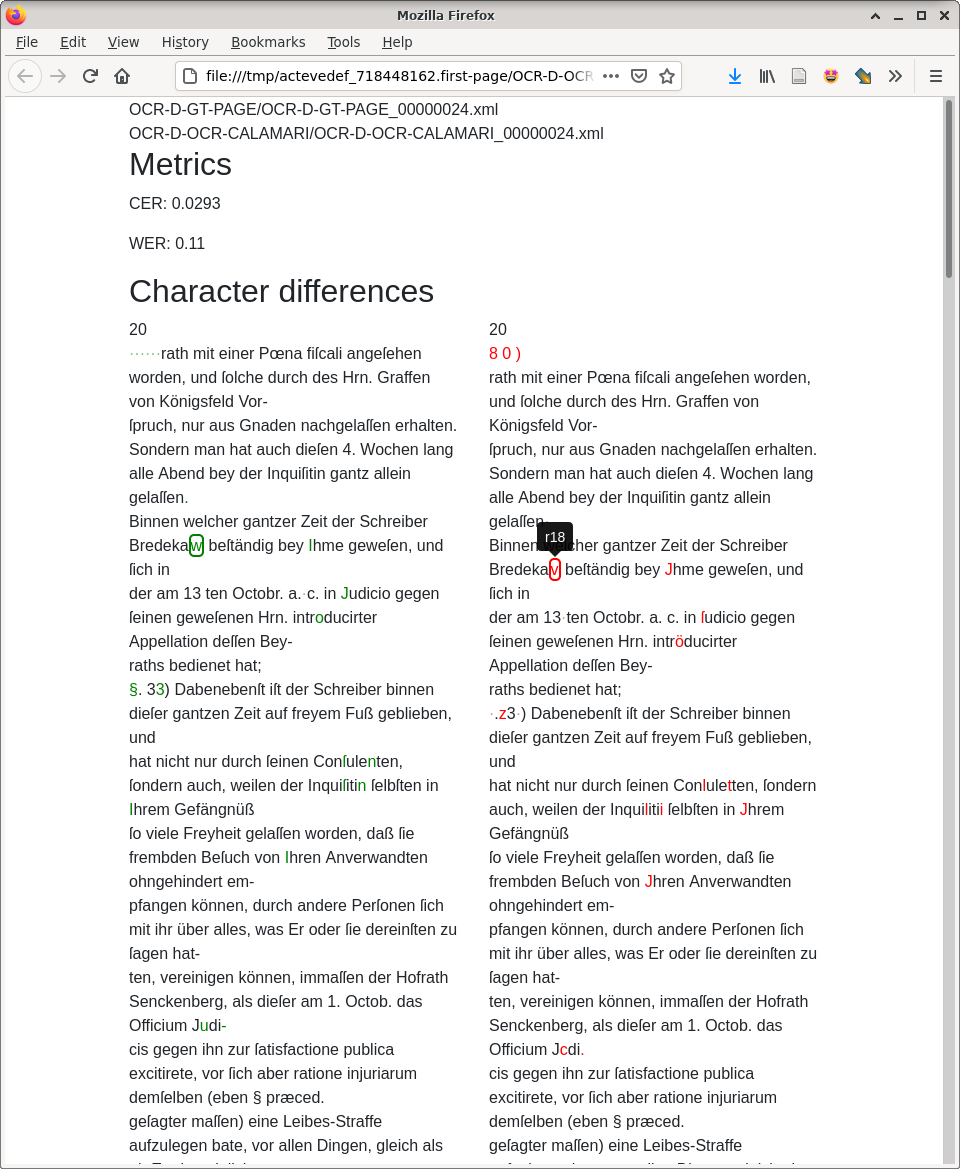| .github/workflows | ||
| .screenshots | ||
| src/dinglehopper | ||
| .coveragerc | ||
| .drone.jsonnet | ||
| .editorconfig | ||
| .gitignore | ||
| .pre-commit-config.yaml | ||
| LICENSE | ||
| ocrd-tool.json | ||
| pyproject.toml | ||
| README-DEV.md | ||
| README.md | ||
| requirements-dev.txt | ||
| requirements.txt | ||
dinglehopper
dinglehopper is an OCR evaluation tool and reads ALTO, PAGE and text files. It compares a ground truth (GT) document page with a OCR result page to compute metrics and a word/character differences report. It also supports batch processing by generating, aggregating and summarizing multiple reports.
Goals
- Useful
- As a UI tool
- For an automated evaluation
- As a library
- Unicode support
Installation
It's best to use pip to install the package from PyPI, e.g.:
pip install dinglehopper
Usage
Usage: dinglehopper [OPTIONS] GT OCR [REPORT_PREFIX] [REPORTS_FOLDER]
Compare the PAGE/ALTO/text document GT against the document OCR.
dinglehopper detects if GT/OCR are ALTO or PAGE XML documents to extract
their text and falls back to plain text if no ALTO or PAGE is detected.
The files GT and OCR are usually a ground truth document and the result of
an OCR software, but you may use dinglehopper to compare two OCR results. In
that case, use --no-metrics to disable the then meaningless metrics and also
change the color scheme from green/red to blue.
The comparison report will be written to
$REPORTS_FOLDER/$REPORT_PREFIX.{html,json}, where $REPORTS_FOLDER defaults
to the current working directory and $REPORT_PREFIX defaults to "report".
The reports include the character error rate (CER) and the word error rate
(WER).
By default, the text of PAGE files is extracted on 'region' level. You may
use "--textequiv-level line" to extract from the level of TextLine tags.
Options:
--metrics / --no-metrics Enable/disable metrics and green/red
--differences BOOLEAN Enable reporting character and word level
differences
--textequiv-level LEVEL PAGE TextEquiv level to extract text from
--progress Show progress bar
--help Show this message and exit.
For example:
dinglehopper some-document.gt.page.xml some-document.ocr.alto.xml
This generates report.html and report.json.
Batch comparison between folders of GT and OCR files can be done by simply providing folders:
dinglehopper gt/ ocr/ report output_folder/
This assumes that you have files with the same name in both folders, e.g.
gt/00000001.page.xml and ocr/00000001.alto.xml.
The example generates reports for each set of files, with the prefix report, in the
(automatically created) folder output_folder/.
By default, the JSON report does not contain the character and word differences, only
the calculated metrics. If you want to include the differences, use the
--differences flag:
dinglehopper gt/ ocr/ report output_folder/ --differences
dinglehopper-summarize
A set of (JSON) reports can be summarized into a single set of reports. This is useful after having generated reports in batch. Example:
dinglehopper-summarize output_folder/
This generates summary.html and summary.json in the same output_folder.
If you are summarizing many reports and have used the --differences flag while
generating them, it may be useful to limit the number of differences reported by using
the --occurences-threshold parameter. This will reduce the size of the generated HTML
report, making it easier to open and navigate. Note that the JSON report will still
contain all differences. Example:
dinglehopper-summarize output_folder/ --occurences-threshold 10
dinglehopper-line-dirs
You also may want to compare a directory of GT text files (i.e. gt/line0001.gt.txt)
with a directory of OCR text files (i.e. ocr/line0001.some-ocr.txt) with a separate
CLI interface:
dinglehopper-line-dirs gt/ ocr/
dinglehopper-extract
The tool dinglehopper-extract extracts the text of the given input file on
stdout, for example:
dinglehopper-extract --textequiv-level line OCR-D-GT-PAGE/00000024.page.xml
OCR-D
As a OCR-D processor:
ocrd-dinglehopper -I OCR-D-GT-PAGE,OCR-D-OCR-TESS -O OCR-D-OCR-TESS-EVAL
This generates HTML and JSON reports in the OCR-D-OCR-TESS-EVAL filegroup.
The OCR-D processor has these parameters:
| Parameter | Meaning |
|---|---|
-P metrics false |
Disable metrics and the green-red color scheme (default: enabled) |
-P textequiv_level line |
(PAGE) Extract text from TextLine level (default: TextRegion level) |
For example:
ocrd-dinglehopper -I ABBYY-FULLTEXT,OCR-D-OCR-CALAMARI -O OCR-D-OCR-COMPARE-ABBYY-CALAMARI -P metrics false
Developer information
Please refer to README-DEV.md.



